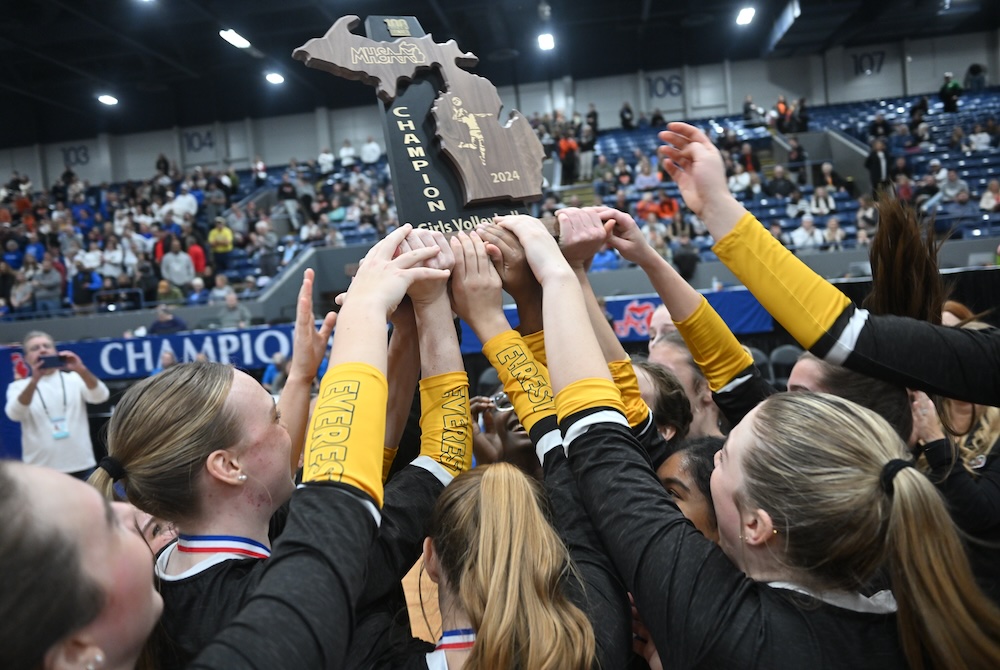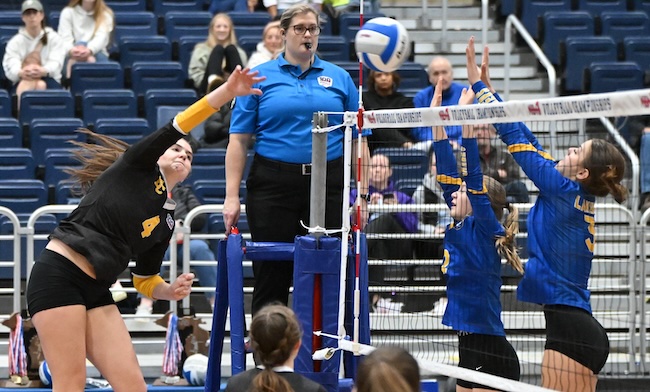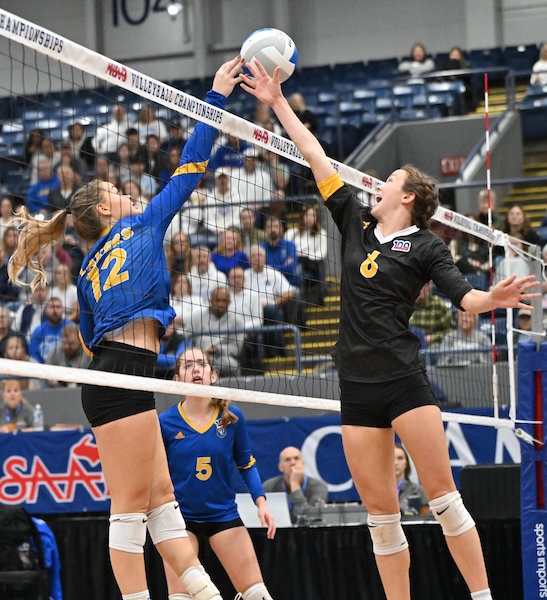
Casting Lines for Future Tournaments
August 12, 2016
By Jack Roberts
MHSAA Executive Director
The MHSAA is best known to the public for the tournaments it conducts to conclude the fall, winter and spring seasons each school year.
These tournaments, the first and largest program of the MHSAA, have survived the Vietnam War, the Korean conflict and two World Wars. They have survived the technology bubble, the housing collapse, the energy crisis and the Great Depression.
MHSAA tournaments existed at the dawn of aviation and at the time of our nation’s lunar landing. Popes, presidents and governors have changed and changed again and again, and MHSAA tournaments roll on year after year.
But the sense of tradition and permanence and inevitability of MHSAA tournaments doesn’t dissuade us from asking questions about our tournaments, even some of the most basic questions. Here are two.
Question #1
I have long been and will always be an advocate for a Ryder Cup format for the MHSAA Golf Finals, and a team tennis approach to the MHSAA Tennis Finals; but 90 years of tradition is hard to overcome. Might this be a more exciting format? Could it be co-ed? Could it reverse the decline in boys tennis participation, and increase girls golf participation? Wouldn’t it be fun to try?
Periodically, the International Olympic Committee requires each of the designated Olympic sports to defend its status, to state its case why the sport should remain a part of the Olympic program. Then, after a series or votes that retain one sport at a time, the IOC drops the sport that makes the weakest case. It does so to make room for one of the previously unlisted sports that makes the best case for inclusion.
This would appear to keep the existing Olympic sports on their toes, and to keep the Olympic movement fresh and reflective of modern trends in sports.
While I would not enjoy the controversy, I can see the potential for some positive results if the MHSAA were to invoke the same policy for determining the 14 tournaments it will provide for girls and the 14 for boys.
This might cause us to consider more deeply what a high school sport should look like, or at least what an MHSAA tournament sport should stand for.
On the one hand, we might be inclined to drop tournaments for those sports that involve mostly non-faculty coaches and non-school venues, or require cooperative programs to generate enough participants to support a team, or resort almost entirely to non-school funding, or cater to individuals more than teams.
Or perhaps this process would cause policymakers to forget traditional thinking and ask: “In this day and age, should we shake off traditional notions of sport and consider more where modern kids are coming from?” That might mean fewer team sports and more individual sports, more “extreme” sports like snowboarding and skateboarding, and more lifetime sports, meaning not just golf and tennis and running sports, but also fishing and even shooting sports.
Currently, MHSAA policy states that the MHSAA will consider sponsorship of a tournament series for any sport which 64 member schools conduct on an interscholastic basis as a result of action by the governing boards of those schools.
Should the only question be how many schools sponsor a sport, or must an activity also have certain qualities and/or avoid certain “defects?” What should an MHSAA tournament sport look like and stand for?
Question #2
Bristling from criticism that his association is a money-grabbing exploiter of children, my counterpart in another state said, “If we were running our programs just to make money, we would do very many things very differently.” I knew exactly what he meant.
Because we care about the health and welfare of students, because we mean what we say that the athletic program needs to maximize the ways it enhances the school experience while minimizing academic conflicts, and because we try to model our claim that no sport is a minor sport when it comes to its potential to teach young people life lessons, we operate our programs in ways that make promoters, marketers and business entrepreneurs laugh, cry or cringe.
If money were the only object, we would seed and select sites to assure the teams that attracted the most spectators had the best chance to advance in our tournaments, regardless of the travel for any team or its fan base. If money were the only object, we would never schedule two tournaments to overlap and compete for public attention, much less tolerate three or four overlapping events. If money were the only object, we would allow signage like NASCAR events and promotions like minor league baseball games.
Those approaches to event sponsorship may not be all wrong; they’re just not all right for us. And we will live with the consequences of our belief system.
During a typical school year, more than 20 percent of the MHSAA’s 2,097 District, Regional and Final tournaments lose money. Not a single site in golf, skiing or tennis makes a single penny. In no sport did every District, Regional and Final site have revenue in excess of direct expenses.
In fact, in only three sports – boys and girls basketball and football – is revenue so much greater than direct expenses overall that it helps to pay for all the other tournaments in which the MHSAA invests.
That’s right: invests. When we present our budget to our board, we talk about the MHSAA’s investment in providing tournament opportunities in all those sports and all those places that cannot sustain the cost of those events on their own. How much is this investment worth to students, schools and society?
These two are core questions that require our focus far in advance of talk about scheduling, site selection, seeding and the myriad matters that too often hijack our time and attention.

Clarkston Everest Collegiate Caps Repeat as 1st Undefeated Champ Since 2015
By
Paul Costanzo
Special for MHSAA.com
November 23, 2024
BATTLE CREEK – Sarah Bradley and her Clarkston Everest Collegiate volleyball teammates accomplished something Saturday that hasn’t been done since 2015.
Behind 28 kills from the senior outside hitter, the Mountaineers completed an unbeaten season and defeated St. Joseph Our Lady of the Lake Catholic in four sets at Kellogg Arena, claiming their second-straight Division 4 Finals title.
But when it all ended, and she was asked to look back on the accomplishments, Bradley looked more toward the bond she and her teammates had created.
“Yes, we won two state championships, but nothing will ever amount to the amount of fun I had with these girls and this team,” Bradley said through tears. “I’m so sad to leave them and everyone behind. I think this season, we really played for each other, and it’s going to be so hard to leave them.”
Everest won 25-23, 25-21, 21-25, 25-13 to finish 37-0-1 on the year, with a split against two-time reigning Division 2 champion North Branch the only match result that kept the team from achieving perfection. It was the first undefeated season for any Michigan high school volleyball team since Ann Arbor Father Gabriel Richard accomplished the feat in winning Class B in 2015.
 The dropped set was one of just six that the Mountaineers lost all season.
The dropped set was one of just six that the Mountaineers lost all season.
“Everyone on the team was dialed in, everyone was in on the effort to go back to back,” Everest senior middle Addison Pearce said. “It wasn’t just a couple people that were like, ‘Oh, this is something we could do.’ It was everyone combined that worked hard every day, didn’t let anything come in our way to keep our momentum going.”
Madelyn Krappmann had 16 assists and 14 digs for the Mountaineers, and Pearce had 10 kills and five blocks. Erica Walker added 45 assists and 14 digs, while Bradley had 16 digs and Samantha Pietras had 14.
A year ago, Everest came into the final weekend as an underdog seeking its first Finals title. This year, it had to hold off an incredible effort from a St. Joseph Our Lady team that was in a similar position, albeit as a much bigger underdog.
The Lakers were making the first Finals weekend trip in program history, as five seniors led the charge to Thursday’s Semifinals. But they were the only five players on the roster who are actually in high school. Two eighth graders rounded out the seven-player team, which is allowed due to the enrollment of the school (61 students).
“I just feel like we played hard; there’s no question about that,” Lakers coach Erin Cashen said. “We knew this was going to be one heck of a feat to do. Seven players, two eighth graders that had never played before this season. We knew it was going to be tough. They were just too much for us in the end.
“I’m really just so proud of our girls. Nothing’s changed for me. I’m really proud of you guys. I think you did some amazing things. I’m pretty sure you didn’t believe me when I took the position two years ago and said I’m going to take you to state. And, here we are. I did it for you, and you deserve it.”
 Nora Proos led St. Joseph Our Lady with 25 kills and 14 digs, while Jojo Marsh had 10 kills and 15 digs. Aislin Sargent added 34 assists for the Lakers (34-4-1), and Ellie Howard had 16 digs.
Nora Proos led St. Joseph Our Lady with 25 kills and 14 digs, while Jojo Marsh had 10 kills and 15 digs. Aislin Sargent added 34 assists for the Lakers (34-4-1), and Ellie Howard had 16 digs.
Winning the third set against the unbeaten soon-to-be repeat champ was certainly a badge of honor for the Lakers, although they agreed it may have woken something up in the Mountaineers.
“I think it’s great that we were able to take a set,” Marsh said. “We didn’t win the whole thing, but we did take a set. That’s huge for all of us. Everyone just played their hearts out, you could tell. You could tell it was our last game, everyone was flying everywhere and the eighth graders really stepped up. It was a really great season.”
After the first three sets were incredibly close, Everest did open things up in the fourth, winning 11 of the final 14 points in the match. It ended, fittingly, with an emphatic spike from Krappmann.
“I’m incredibly grateful that I had that opportunity, that Erica (Walker) set me that ball,” Krappmann said. “Something was off the first few sets. Passing and defense were OK, but hitting, I just had this weird disconnect. … We got to the fourth one, and I was hyped up, ready to go. Something switched, and I was like, ‘I want this.’ I just felt like I had control of the ball.
“On the last one, I felt like, ‘This could be the game point. This could be our second state championship. This could be the last point we play for Everest.’ Of course I want to give everything I have to that point, out of respect and gratitude to this team and my coach, and to all the people that support us.”
PHOTOS (Top) Clarkston Everest Collegiate players raise their championship trophy Saturday at Kellogg Arena. (Middle) The Mountaineers’ Sarah Bradley (4) sends a spike into the block of Rachel Kalamaros (3) and another Lakers teammate. (Below) Our Lady’s Nora Proos (12) and Everest’s Erica Walker (6) contend for a ball. (Photos by Hockey Weekly Action Photos.)

